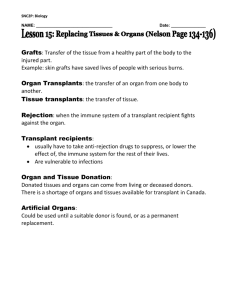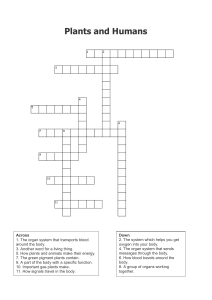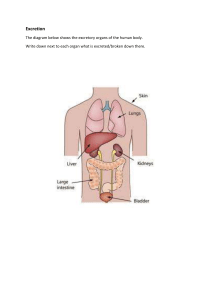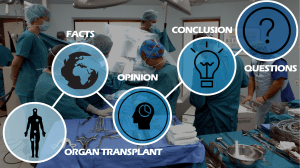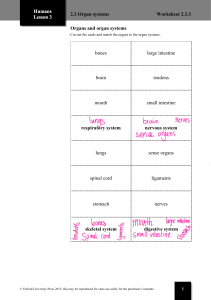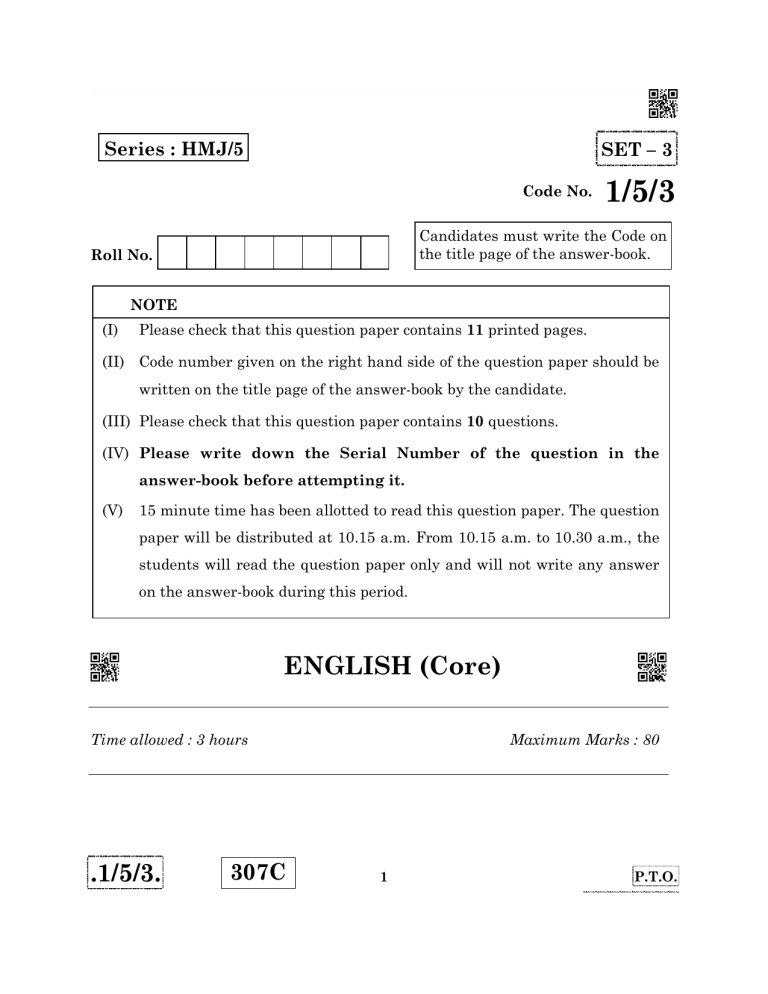
Series : HMJ/5 SET – 3 Code No. 1/5/3 Candidates must write the Code on the title page of the answer-book. Roll No. NOTE (I) Please check that this question paper contains 11 printed pages. (II) Code number given on the right hand side of the question paper should be written on the title page of the answer-book by the candidate. (III) Please check that this question paper contains 10 questions. (IV) Please write down the Serial Number of the question in the answer-book before attempting it. (V) 15 minute time has been allotted to read this question paper. The question paper will be distributed at 10.15 a.m. From 10.15 a.m. to 10.30 a.m., the students will read the question paper only and will not write any answer on the answer-book during this period. ENGLISH (Core) Time allowed : 3 hours .1/5/3. 307C Maximum Marks : 80 1 P.T.O. General Instructions : Read the following instructions very carefully and strictly follow them : (i) The question paper comprises three Sections – A, B and C. Section A – 20 marks Section B – 30 marks Section C – 30 marks (ii) There are 10 questions in the question paper. All questions are compulsory. (iii) There is no overall choice. However, an internal choice has been provided in one question in Section A, four questions in Section B and three questions in Section C. Make your choice correctly. (iv) However, separate instructions are given with each section and question, wherever necessary. (v) .1/5/3. Do not exceed the prescribed word limit while answering the questions. 2 Section – A (Reading) 1. 20 Read the passage given below : 12 Donated Organs and their Transportation (1) Once an organ donor’s family gives its consent and the organs are matched to a recipient, medical professionals are faced with the onerous challenge of transporting organs while ensuring that the harvested organ reaches its destination in the shortest possible time. This is done in order to preserve the harvested organs and involves the police and especially the traffic police department. (2) The traditional method of transporting organs by road is referred to as a “green corridor”. This process entails police escorting an ambulance, so as to move around traffic – usually a specific traffic lane is chosen and all signals on the route stay green to ensure it to reach its destination in the shortest possible time. A ‘green corridor’ is a route cleared and cordoned off by the traffic police to ensure the smooth and steady transportation of harvested organs, on most occasions, to those awaiting a life-saving transplant. Organs tend to have a very short preservation time, such as the heart which has to be harvested and transplanted within four hours or the lungs which can be preserved for only six hours once they are harvested. (3) The first green corridor in India was created by Chennai Traffic Police in September 2008 when they accomplished their task of enabling an ambulance to reach its destination within 11 minutes during peak hour traffic. That organ saved a nine-year-old girl whose life depended on the transplant. .1/5/3. 3 P.T.O. (4) Similarly, such green corridors have been created by traffic police of various cities such as Pune, Mumbai, Delhi NCR etc. Personnel are stationed at selected points to divert, control and clear the traffic giving way to the ambulance. Apart from this, a motorcade of police vehicles accompanies the ambulance ensuring that it does not face any problems. Delhi Traffic Police provided a green corridor from IGI Airport to Institute of Liver and Biliary Sciences in Vasant Kunj for transportation of a liver. The distance of 14 kms was covered in 11 minutes. (5) Experts point out the lack of a robust system to transport organs to super-speciality hospitals in least possible time. National Organ & Tissue Transplant Organisation (NOTTO), the country’s apex organ donation agency, is now framing a proposal to airlift cadaver organs and will send a report to the Union Health Ministry. “Cadaver organs have a short life and so transplant should be done within a few golden hours.” Director (NOTTO) expressed, “Therefore, we are preparing a proposal for airlifting organs at any given moment.” (6) Most states do not have enough well-trained experts to retrieve or perform transplant procedures. Also, there is an acute shortage of advanced healthcare facilities to carry out a transplant. So, it is referred to other big centres in metropolitan cities. Organs retrieved from Aurangabad, Indore, Surat, Pune are sent to Mumbai as these cities do not have super-speciality healthcare centres, informed officials. (7) “In India, about fifty thousand to one lakh patients are suffering from acute heart failure and need heart transplant at any point of time. In a private set-up, a heart transplant costs ` 15-20 lakhs, which is followed up by postoperative medication of about ` 30,000 per month lifelong.” .1/5/3. 4 1.1 On the basis of your understanding of the above passage, answer any five of the following questions by choosing the most appropriate options : 1×5=5 (a) The first green corridor in India was created in : (i) New Delhi (ii) (iii) Mumbai (b) Chennai (iv) Pune The organization which is framing a proposal to airlift cadaver organs is : (i) Union Health Ministry (ii) Regional Organ and Tissue Transplant Organisation (iii) National Organ and Tissue Transplant Organisation (iv) State Organ and Tissue Transplant Organisation (c) The onerous task the author is talking about in para 1 is : (i) finding organ donors. (ii) finding doctors capable of performing transplants. (iii) to carry the harvested organ in the shortest possible time. (iv) to arrange the requisite facilities for the transplant. (d) Most of the people do not go for the heart transplant as : (i) it is very risky. (ii) it is very painful. (iii) it may cause death of the recipient. (iv) the cost is prohibitive. .1/5/3. 5 P.T.O. (e) Most states refer organ transplant cases to big hospitals because (i) they don’t have well-trained experts. (ii) the patients don’t trust local doctors. (iii) the state hospitals are very crowded. (iv) they don’t have a pool of harvested organs. (f) Heart retrieved from a body is alive only for _____ hours. (i) two (ii) (iii) four three (iv) five 1.2 Answer the following questions briefly : 1×5=5 (a) What is a ‘green corridor’ ? (b) Why is smooth transportation of the retrieved organ necessary ? (c) What opinion do you form of Chennai Police with regard to the transportation of a harvested heart ? (d) What does the author mean by ‘a few golden hours’ ? (e) How much does a heart transplant cost a patient in a private hospital ? 1.3 Pick out the words from the passage which mean the same as the following : .1/5/3. (a) save (para 1) (b) achieved / carried out 1×2=2 (para 3) 6 2. Read the following passage : (1) 8 How does television affect our lives ? It can be very helpful to people who carefully choose the shows that they watch. Television can increase our knowledge of the outside world; there are high-quality programmes that help us understand many fields of study, science, medicine, the different arts and so on. Moreover, television benefits very old people, who can’t leave the house, as well as patients in hospitals. It also offers non-native speakers the advantages of daily informal language practice. They can increase their vocabulary and practise listening. (2) On the other hand, there are several serious disadvantages of television. Of course, it provides us with a pleasant way to relax and spend our free time, but in some countries people watch television for an average of six hours or more a day. Many children stare at the TV screen for more hours a day than they spend on anything else, including studying and sleeping. Its clear that TV has a powerful influence on their lives and that its influence is often negative. (3) Recent studies show that after only thirty seconds of television viewing, a person’s brain ‘relaxes’ the same way that it does just before the person falls asleep. Another effect of television on the human brain is that it seems to cause poor concentration. Children who view a lot of television can often concentrate on a subject for only fifteen to twenty minutes. They can pay attention only for the amount of time between commercials. .1/5/3. 7 P.T.O. (4) Another disadvantage is that television often causes people to become dissatisfied with their own lives. Real life does not seem so exciting to these people. To many people, television becomes more real than reality and their own lives seem boring. Also many people get upset or depressed when they can’t solve problems in real life as quickly as television actors seem to. (5) Before a child is fourteen years old, he or she views eleven thousand murders on the TV. He or she begins to believe that there is nothing strange about fights, killings and other kinds of violence. Many studies show that people become more violent after viewing certain programmes. They may even do the things that they see in a violent show. (a) On the basis of your reading of the above passage, make notes on it using Headings and Subheadings. Use recognizable abbreviations (minimum four) and a format you consider (b) suitable. Supply a suitable title to it. 4 Make a summary of the above passage in about 80 words. 4 Section – B (Writing Skills) 3. 30 You are Dhruv / Nidhi, Student Editor of your school magazine, ‘The Buds’. Write a notice in not more than 50 words to be placed on your school notice board, inviting short stories, articles, poems etc from students of all classes for the school magazine. Give all the necessary details. 4 OR You are Vinod / Vineeta, General Manager, Global Solutions, Meerut. You want to rent a bungalow to be used as a guest house. It should have all the modern amenities. Draft a suitable advertisement in not more than 50 words to be published in a local newspaper. .1/5/3. 8 4 4. A book fair was organized in your city, Bhopal. Thousands of people including a large number of students visited the fair. It aroused a great interest in reading and buying books. You want that such book fairs are held in other cities of the state also to promote the habit of reading. Write a letter in 120-150 words to the editor of a local newspaper giving your views. You are Navtej / Navita, F-112 Malviya Nagar, Bhopal. 6 OR You carried a hit and run accident victim to a local hospital. You were shocked to see that in its casualty ward the conditions were chaotic. The patient was attended to after a lot of precious time was lost. You are Deepak / Deepa, A-114 Roop Nagar, Delhi. Write a letter of complaint in 120-150 words to the Chief Medical Officer of the hospital. 5. 6 Every year there are floods or droughts in the country. Victims suffer a lot. The government does a lot to help the people, but it is not enough. Society also must do its bit. Write a speech in 150-200 words to be delivered in the school morning assembly describing how the students can also help by collecting clothes, money and medicines from their neighbourhoods. You are Arun / Aruna. 10 OR ‘Rain harvesting is the only solution to water crisis in the present times.’ Write a debate either for or against the motion in 150-200 words. You are Sujatha / Ajith. .1/5/3. 10 9 P.T.O. 6. History Club of your school organized a picnic on a river bank. During the picnic you observed a small boat (with two persons in it) sinking. You saw a good swimmer jump into the river and rescue the two persons in the boat. Write a report in 150-200 words on the picnic and the rescue. You are Rohit of 2, Mall Road, Kanpur. 10 OR Wearing the school uniform gives the student an identity, pride and a feeling of discipline. Write an article in 150-200 words on, ‘Importance of wearing a uniform in school’. You are Jagan / Jagriti. 10 Section – C (Literature : Text Books) 7. 30 Read the extracts given below and briefly answer the questions that follow each. (a) 4+4=8 But just as he laid his head on the ground, he heard a sound – a hard regular thumping. There was no doubt as to what that was. He raised himself. “Those are the hammer strokes from an iron mill”, he thought. (b) (i) Who is he ? 1 (ii) Where was ‘he’ at that moment ? 1 (iii) Why did he lay his head on the ground ? 1 (iv) Did he feel comfortable on hearing the thumping sound ? Why ? 1 And such too is the grandeur of the dooms We have imagined for the mighty dead; All lovely tales that we have heard or read; An endless fountain of immortal drink, Pouring unto us from the heaven’s brink. .1/5/3. (i) Which two things of beauty are mentioned in these lines ? 1 (ii) Why are the ‘lovely tales’ called an endless fountain ? 1 (iii) Where is this fountain situated ? 1 (iv) Explain : ‘grandeur of the dooms’. 1 10 8. Answer any five of the following questions in 30-40 words each : (a) 2 × 5 = 10 How is the mother tongue important to a person ? What does M. Hamel, the teacher say about it ? (b) Why didn’t Sophie want Jansie to know about her meeting with Danny Casey ? (c) How bad were the living conditions in which Mukesh and his family survived ? (d) Why has the poet mentioned ‘merry children spilling out of their homes’ in the poem ? (My Mother at Sixty-six) (e) How is Antarctica different from the place you live in ? (f) On seeing Roger Skunk again with a very bad smell, how did the little animals react first and then later on when he had lost it ? (g) “I felt like sinking to the floor”, said Zitkala-Sa. When did she feel so and why ? 9. Answer the following question in 120-150 words. How did Douglas develop a fear of water ? 6 OR How did Civil Disobedience triumph at Motihari ? (Indigo) 6 10. Answer the following question in 120-150 words : Describe briefly the scene at the third level of Grand Central as seen (or seemed to be seen) by Charley. 6 OR How did Dr. Sadao resolve the conflict in his mind between his loyalty to his country and his duty as a doctor ? 6 ____________ .1/5/3. 11 P.T.O. .1/5/3. 12
